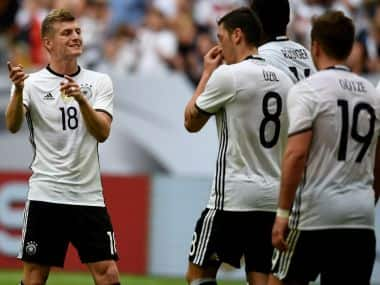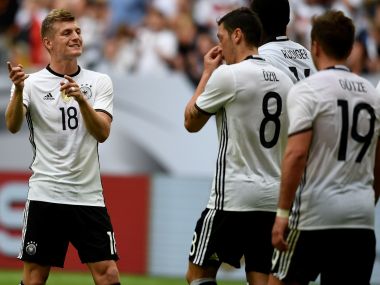The Germans are at it again. The weeks leading up to a major tournament are being spent sweating away over the fitness of some of the team’s core players. Friendly matches over the past year have brought more creases to the forehead of German fans. The qualifying campaign was not the most straightforward either. The supporters and pundits are starting to worry. All of that probably suggest Germany will be alright. Such is the tendency to play down the national team’s chances before the tournament that the bluff does not even work anymore. This is not to say that there are no issues with the side. Problems persist but if history is a reliable indicator, solutions will arrive soon. Before the 2014 World Cup, manager Joachim Löw had made it clear that only fully fit players would board the flight to Brazil. However, a stream of injuries caused him to seriously rethink the idea. Marco Reus was ruled out of the tournament; Manuel Neuer, Philipp Lahm, Bastian Schweinsteiger and Sami Khedira were still on the mend with the World Cup days away. [caption id=“attachment_2826426” align=“alignleft” width=“380”] Germany have a host of problems, but history says that’s no problem at all. AFP[/caption] In the end, it all came together as Löw oversaw a victorious campaign. Germany had suffered a host of near misses since the 2006 World Cup but the team displayed nous and maturity to become world champions. For Löw, this represented a remarkable turnaround as he had faced intense speculation over his job in the lead up to the tournament. The scrutiny had become sharper due to Germany’s surprise loss to Italy in the 2012 Euro semifinal, a tournament the side had started as favourites. As opposed to the stereotype, the 2014 squad was seemed as “too nice” and obsessed with playing attractive football. It was a serious charge laid at Löw’s door. However, the manager stuck to his guns and won the tournament while delighting the world with his flair-imbued side. The World Cup win will continue to inform his actions in moments of doubt, if there are any in France. Löw’s loyalty to the players he won it with has seen him call Schweinsteiger and Lukas Podolski up to the squad despite their underwhelming seasons. Schweinsteiger is fighting fitness concerns once again. He played a little over 20 minutes in the 2-0 friendly win over Hungary on Saturday but it remains to be seen whether he can last an entire match. The waning of his powers does not help his case. German fans will remember how an out-of-sorts Schweinsteiger laboured throughout the semifinal defeat to Italy four years ago. However, Löw recognises the value of experienced figures like Schweinsteiger and Podolski. In times of distress, they can be significant allies in rallying the troops. However, if the team plays to its potential, such worries should hugely subside. Löw’s coaching drills provide another advantage. He is known to train the national side like a club team, a relative luxury in major competitions. Germany should have little worries over progressing from Group C as it faces Ukraine, Poland and Northern Ireland. It should be remembered, though, that the Poles recorded a win over the Germans in qualification. Anything but a place in the final, however, would be seen as a failure. There’s no reason why Löw’s side cannot match the expectations. The quality at his disposal should be good enough to beat any side. However, as German pundits and fans will tell you, there are problems. Particularly in defence. Although Neuer is a reliable figure between the sticks, the makeup of the back four does not readily inspire confidence. Liverpool’s Emre Can plays as a makeshift right back while FC Cologne’s left-back Jonas Hector is relatively inexperienced at the international level. Schalke’s Benedikt Höwedes played on the left at the World Cup but he has seemingly fallen out of favour. To further complicate matters, Mats Hummels is set to miss out the first two group games versus Ukraine and Poland. This means that Jerome Boateng will be accompanied by Roma’s Antonio Rudiger, another inexperienced figure, in the heart of the defence. Toni Kroos and Khedira will form the midfield partnership in the 4-2-3-1 setup. The front four will definitely see Mesut Özil and Thomas Müller but the absence of Reus for the second tournament running means that the other two spots are up for grabs. Mario Götze is not the player he was touted to be when he scored the winner in the World Cup final two years ago but he is likely to start on the left with a rejuvenated Mario Gomez in the lone striker position. Alternatively, he could play as a false nine with Julian Draxler getting a look in on the left. Germany suffered defeats to Poland and Republic of Ireland in its qualifying group and as those defeats showed, a loss in concentration is a veritable danger to Germany’s fortunes. This problem became more obvious in the team’s 2-3 reverse against England in Berlin earlier this year. However, such issues have been swept aside by the German national team in the past and there’s no reason to believe this time will be different. Nobody should be shocked if Germany lift the Henri Delaunay Cup at the Stade de France on 10 July.
Germany have a host of problems, but history says that’s no problem at all. AFP[/caption] In the end, it all came together as Löw oversaw a victorious campaign. Germany had suffered a host of near misses since the 2006 World Cup but the team displayed nous and maturity to become world champions. For Löw, this represented a remarkable turnaround as he had faced intense speculation over his job in the lead up to the tournament. The scrutiny had become sharper due to Germany’s surprise loss to Italy in the 2012 Euro semifinal, a tournament the side had started as favourites. As opposed to the stereotype, the 2014 squad was seemed as “too nice” and obsessed with playing attractive football. It was a serious charge laid at Löw’s door. However, the manager stuck to his guns and won the tournament while delighting the world with his flair-imbued side. The World Cup win will continue to inform his actions in moments of doubt, if there are any in France. Löw’s loyalty to the players he won it with has seen him call Schweinsteiger and Lukas Podolski up to the squad despite their underwhelming seasons. Schweinsteiger is fighting fitness concerns once again. He played a little over 20 minutes in the 2-0 friendly win over Hungary on Saturday but it remains to be seen whether he can last an entire match. The waning of his powers does not help his case. German fans will remember how an out-of-sorts Schweinsteiger laboured throughout the semifinal defeat to Italy four years ago. However, Löw recognises the value of experienced figures like Schweinsteiger and Podolski. In times of distress, they can be significant allies in rallying the troops. However, if the team plays to its potential, such worries should hugely subside. Löw’s coaching drills provide another advantage. He is known to train the national side like a club team, a relative luxury in major competitions. Germany should have little worries over progressing from Group C as it faces Ukraine, Poland and Northern Ireland. It should be remembered, though, that the Poles recorded a win over the Germans in qualification. Anything but a place in the final, however, would be seen as a failure. There’s no reason why Löw’s side cannot match the expectations. The quality at his disposal should be good enough to beat any side. However, as German pundits and fans will tell you, there are problems. Particularly in defence. Although Neuer is a reliable figure between the sticks, the makeup of the back four does not readily inspire confidence. Liverpool’s Emre Can plays as a makeshift right back while FC Cologne’s left-back Jonas Hector is relatively inexperienced at the international level. Schalke’s Benedikt Höwedes played on the left at the World Cup but he has seemingly fallen out of favour. To further complicate matters, Mats Hummels is set to miss out the first two group games versus Ukraine and Poland. This means that Jerome Boateng will be accompanied by Roma’s Antonio Rudiger, another inexperienced figure, in the heart of the defence. Toni Kroos and Khedira will form the midfield partnership in the 4-2-3-1 setup. The front four will definitely see Mesut Özil and Thomas Müller but the absence of Reus for the second tournament running means that the other two spots are up for grabs. Mario Götze is not the player he was touted to be when he scored the winner in the World Cup final two years ago but he is likely to start on the left with a rejuvenated Mario Gomez in the lone striker position. Alternatively, he could play as a false nine with Julian Draxler getting a look in on the left. Germany suffered defeats to Poland and Republic of Ireland in its qualifying group and as those defeats showed, a loss in concentration is a veritable danger to Germany’s fortunes. This problem became more obvious in the team’s 2-3 reverse against England in Berlin earlier this year. However, such issues have been swept aside by the German national team in the past and there’s no reason to believe this time will be different. Nobody should be shocked if Germany lift the Henri Delaunay Cup at the Stade de France on 10 July.
Euro 2016: Injury-hit Germany have many problems, but history says that's no problem at all
Priyansh
• June 10, 2016, 18:05:30 IST
Germany has a few problems and the squad is injury-hit, but nobody should be shocked if they win Euro 2016.
Advertisement
)
End of Article